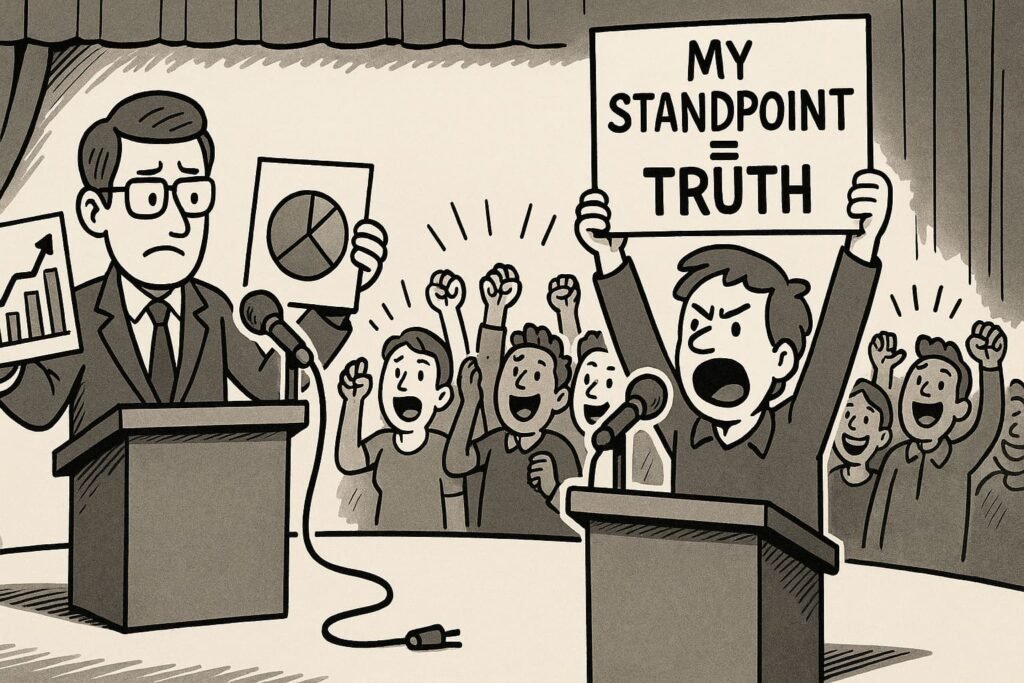Standpoint Theory – Truth by Identity
In the old world, truth came from evidence. In the new one, it comes from your demographic profile. That’s the logic of standpoint theory: your gender, race, or identity gives you a special “standpoint” from which only you can see reality.
It sounds empowering. But in practice, it means truth isn’t universal — it’s chopped up into little fragments, each owned by a group, with some fragments ranked as more “authentic” than others.
Table of contents
Buzzword Breakdown
- Standpoint → Where you sit determines what you see (and what you’re allowed to say).
- Lived Experience → The trump card in any debate.
- Epistemic Privilege → The idea that some groups hold the “real truth” by virtue of oppression.
- Marginalised Voices → Sounds noble, often means activists with a platform.
What Standpoint Theory Really Means
Standpoint theory argues that knowledge isn’t neutral. It says oppressed groups see the world more clearly because they experience injustice directly. Therefore, their perspectives are more valid than those of the so-called privileged.
It flips the hierarchy of truth: the less power you have, the more authority you supposedly hold.
How It Works in Practice
- Academia → Papers argue that science and reason are “biased” toward the dominant group.
- Activism → Identity cards beat evidence in arguments.
- Media → Headlines lean on voices framed as “marginalised” — even if they’re celebrities.
- Institutions → HR sessions teach employees to “decenter” their perspective and defer to others.
The Business of Standpoints
Standpoint theory is highly marketable:
- Universities sell it as advanced critical theory.
- NGOs use it to justify why only certain groups can “speak their truth.”
- Corporations hire consultants to tell staff to check their privilege and “listen” more.
What was once philosophy is now a training product.
The Irony
By claiming only the oppressed see the full truth, standpoint theory creates the very hierarchy it pretends to fight. Instead of universal knowledge, we get tribal knowledge — and the loudest tribe wins.
The result: endless authority wars, where “my standpoint beats yours” replaces actual debate.
Why It Matters
- It fragments society. Shared reality is replaced with identity-specific truths.
- It shuts down debate. Evidence is dismissed if it comes from the “wrong” standpoint.
- It empowers gatekeepers. Activists decide whose voice counts and whose doesn’t.
Conclusion
Standpoint theory sells itself as inclusion — letting new voices into the conversation. In practice, it excludes anyone who doesn’t tick the right identity boxes.
Instead of levelling the playing field, it redraws it so truth becomes a privilege card. Whoever holds the “oppressed” label holds the microphone.
FAQ
What’s the difference between standpoint theory and lived experience?
Standpoint theory is the framework; lived experience is the weapon used inside it.
Isn’t standpoint theory about fairness?
No — it elevates some voices by silencing others.
How do universities spread standpoint theory?
By embedding it in gender studies, sociology, and critical theory courses. See: [Universities – The Factory of Woke Graduates].
Why does it appeal to activists?
It gives them automatic authority in debates without needing evidence. See: Politics & Identity Activism – How Laws Bend Under Pressure.
What’s the risk for society?
It breaks down universal rights and replaces them with identity carve-outs.



